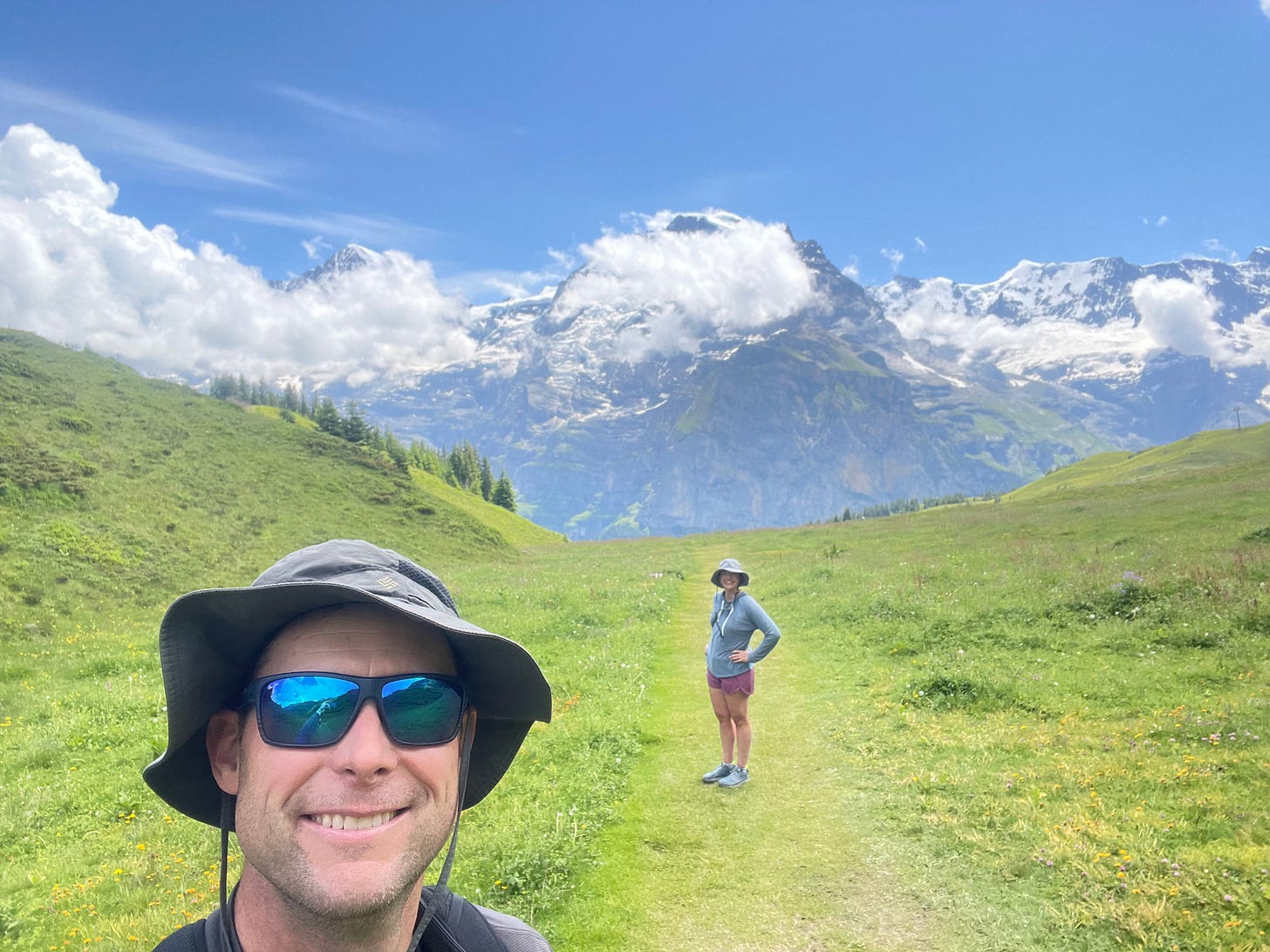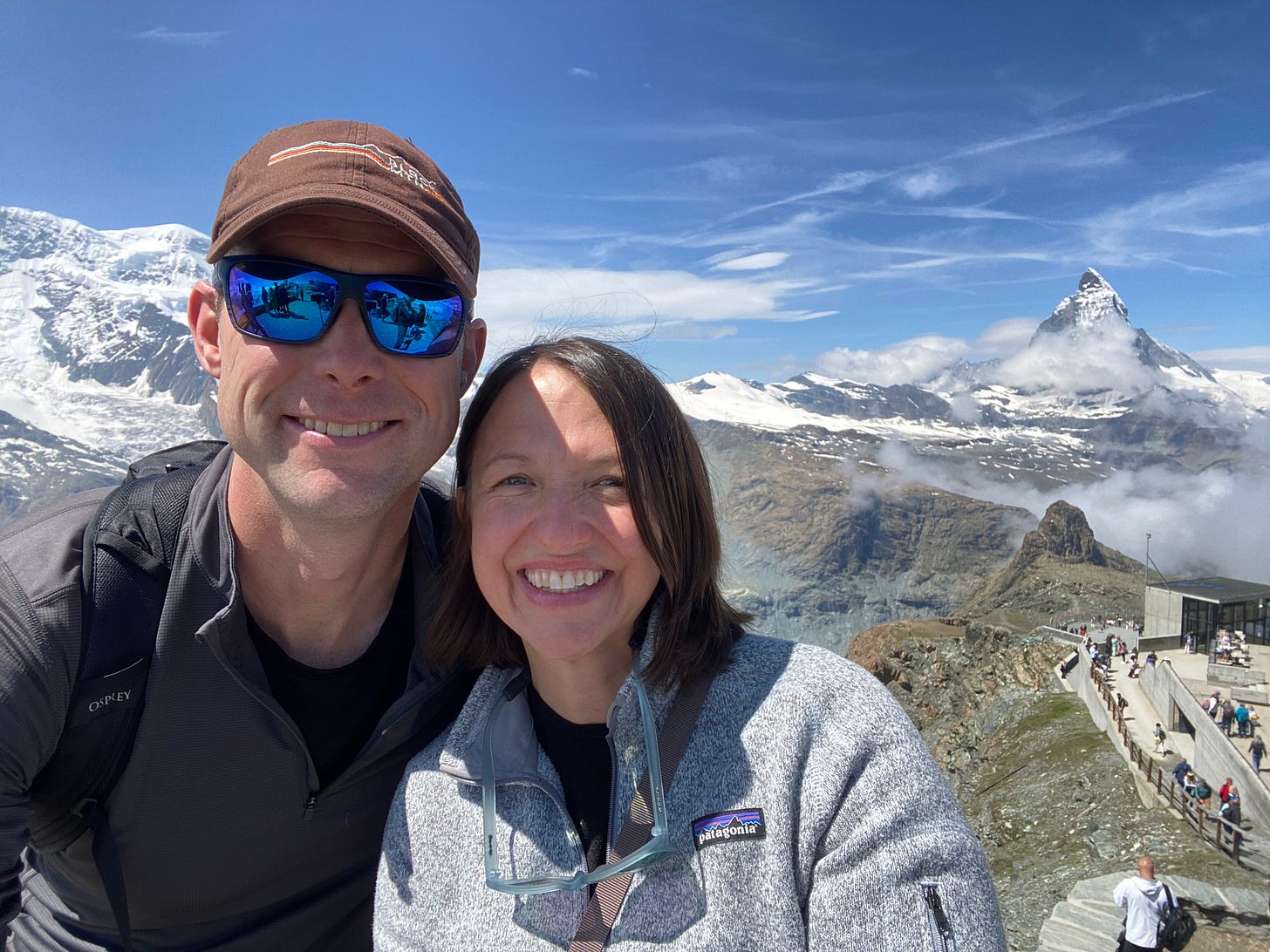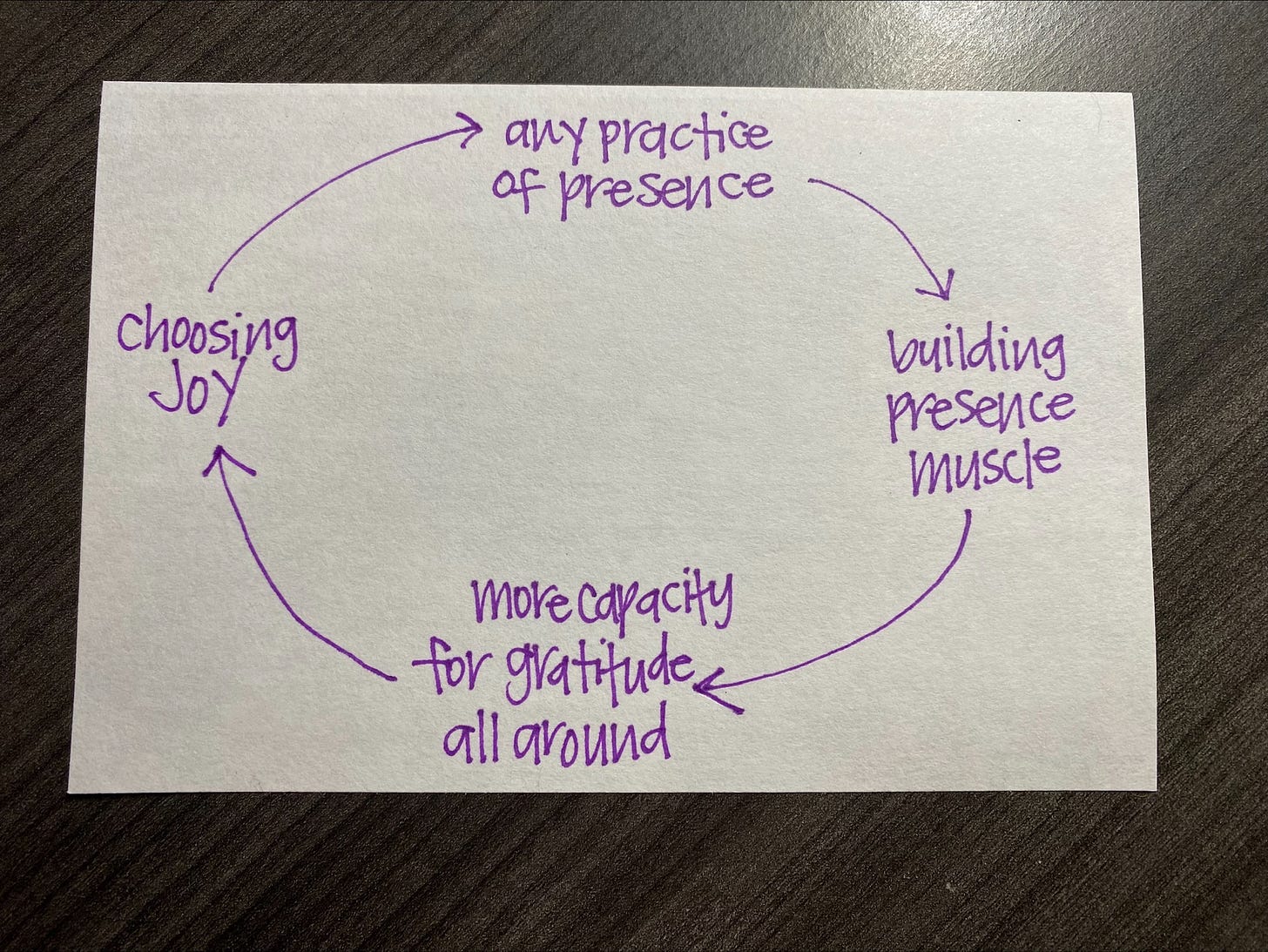This is the newsletter version of Sara by the Season, where I explore what is piquing my curiosity as I try to lean into nature’s wisdom and rhythms. I’m skipping the podcast version this week, but let me know if you miss it so I have some motivation to record one here soon. If you know someone who would like this sort of thing, I’d be so grateful if you would share it.
As I mentioned last week, my list of Switzerland lessons got a little long, so I made a separate list that I’m sharing today. Grant won a prestigious award at work this year, and the prize was a five-day stay in an unbelievable resort on Lake Lucerne in Switzerland. Grant and I had planned a trip to the Swiss Alps and the Italian coast for our fifteenth anniversary in the summer of 2020. We all know how that turned out. So when he received news of this trip, we decided to resurrect our plans from 2020. After some weeks of research, we decided to stay within Switzerland instead of adding the Italian coast because there was so much that we wanted to see and do in Switzerland that we didn’t want to miss. It was, without exaggeration, one of the best two weeks of my life.
Lessons from Switzerland
Why not make it beautiful? We traveled all around Switzerland, and one thing I noticed after about the third stop was how they put flowers everywhere: outside the convenient stores at the train stations, in every window box even the highest up ones that must be annoying to water, in crosswalks and by bike racks. I also noticed that most of the displays were full of annuals like geraniums and petunias. There were some perennials in the more permanent displays, but the bulk of the flowers were annuals. As a bad flower gardener, I don’t plant geraniums and petunias because they require so much work to keep looking pretty - deadheading and pruning and way too much work for this lazy gardener. But in Switzerland, their flowers all looked so gorgeous - prettily pruned, cheery and bright. After about the third day, Grant and I would just look at each other after passing some overpass that could have just been left as-is but instead was surrounded in beautiful, dazzling colors, and say to each other, “why not make it beautiful?!”
This led to bigger conversations:
Why don’t we do this at home? (see lazy gardener reference above)
Does every town have a team of gardeners on staff? (I want that job please)
Keeping up with all of these flowers requires a ton of time and energy. When do they find the time? (they prioritize beauty, obviously)
What would it be like if our city planners made beauty a priority? (Americans would say they didn’t want to spend money on beauty, but what are we missing by not?)
As we traveled around touristy spots and out-of-the-way trails where we didn’t see another person for hours at a time, we kept finding places where the Swiss had intentionally added some splashes of beauty to their, admittedly, already beautiful country. It kept reminding me of the Maggie Smith poem, but it was like the entire country had taken the idea that they could make this place beautiful to heart.
Good Bones
BY MAGGIE SMITH
Life is short, though I keep this from my children.
Life is short, and I’ve shortened mine
in a thousand delicious, ill-advised ways,
a thousand deliciously ill-advised ways
I’ll keep from my children. The world is at least
fifty percent terrible, and that’s a conservative
estimate, though I keep this from my children.
For every bird there is a stone thrown at a bird.
For every loved child, a child broken, bagged,
sunk in a lake. Life is short and the world
is at least half terrible, and for every kind
stranger, there is one who would break you,
though I keep this from my children. I am trying
to sell them the world. Any decent realtor,
walking you through a real shithole, chirps on
about good bones: This place could be beautiful,
right? You could make this place beautiful.
Incentivize (and disincentive) the right things. Switzerland is extremely clean. In most places, in place of one trash can, there are three - one for plastic recycling, one for aluminum recycling, and one for trash. And they’re everywhere. There is no excuse not to recycle because these little recycle centers are what seems like every 100 feet.
Even better, they incentivize less waste to begin with, so you don’t even have to recycle. Most days, to save money and because their pre-made food was delicious, healthy, and super fresh, we would head to the local Coop (a Swiss market chain that I will dream about until we go back) to grab something for lunch on the trail or the train. You don’t get a (paper) bag for your purchases unless you pay for it. Most of their food packaging is compostable or just generally far less than what you see in a typical American grocery store. They don’t offer free napkins or silverware in plastic with their to-go food. You have to pay for a compostable spork, and they just don’t offer napkins. We bought a washcloth to use as a napkin for the duration of the trip and reused our compostable sporks for two weeks.
The streets are designed to prioritize pedestrians first, bikers second, and cars third. Bike parking is free or cheap and readily available. The trains are an absolute dream2. Parking seems expensive, and a pain. Why would anyone drive a car?
We kept saying that Switzerland is far better prepared for the climate crisis than America. They’ve been incentivizing behaviors that make for healthier, cleaner communities as a way of life, and they disincentive behaviors that cause long-term harm to the environment - and by extension - obviously - the humans that live there.
American capitalism is drunk. In many of the smaller towns we visited, the stores closed down for lunch - from 12-1:30. We were shocked at first because it was pretty close to high tourist time, and these stores were missing out on a ton of foot traffic and potential business. Several times over the few weeks we were there, we saw restaurant managers turn away paying customers because they felt it was too cold to sit on the patio, or they were too busy to provide proper service, or because it was too close to closing time.
All of these situations shocked us because, at home, the business owners would have demanded employees work during the busiest parts of the day to make more money. They would have told the restaurant staff to put people on the patio if they wanted to sit there, to tell people to come order a few drinks instead of turning them away, and they would have kept staff late to accommodate late-arriving customers - all so they maximize profits.
Switzerland is often said to be one of the most conservative European countries when it comes to work expectations, and yet, they have so much better work-life balance than we Americans do. This works largely because it is happening in community3. If everyone takes off for a nice lunch break, it makes sense, but as soon as one store starts staying open during the lunch hour, the other stores feel like they have to too or else they’re missing out. They even have a name for the idea of leaving your work at work at the end of the day and enjoying your evening - “feierabend machen.”
We kept joking while we were there that most Americans’ retirement dream is living like a Tuesday evening Swiss person. On the first Tuesday we were in the country, Grant had some work stuff to do, and I went on an adventure of my own. We met back up in a small town on Lake Lucerne for dinner and a walk. We came upon tons of families picnicking by the lake in between dips in the chilly glacial-fed lake. We stopped at a cute neighborhood bar, where we were noticeably out-of-place among the many locals (but welcomed warmly). It was a random Tuesday night, and it appeared that people were enjoying themselves instead of rushing home from work or running off to some activity. This pattern repeated itself everywhere we went.
This bleeds into the “we could do things differently” lesson that I wrote about last week. Switzerland is one of the most capitalist countries on the planet, but they prioritize policies that benefit people so much more than we do that it feels completely different - more equitable, more sustainable, more caring. The best part of traveling is how it opens your imagination to living differently, and Switzerland gave me a peek into how much better we could care for our land and one another if our government and leaders were more concerned about their responsibilities than power and if they weren’t controlled by corporations and special interests.
Lower your expectations and practice presence. I fell hard for Switzerland, which is obvious to anyone who came along for the ride on Instagram4. It turns out that a large percentage of my family tree comes from the region of Switzerland closest to the Italian Alps (which we actually didn’t spend any time in). Maybe there was some kind of ancestral homecoming going on, but I think it probably had more to do with my low expectations going in. I expected to think Switzerland was beautiful, but I wasn’t expecting it to be so unbelievably gorgeous, and I wasn’t expecting to love it so deeply in such a short amount of time. Perhaps if I had higher expectations, I would have been disappointed, but because I had lower expectations, I was able to be present to the beauty of the place and her people in a way that you can’t when you have too many and/or too high of expectations. This is not an argument for walking around as a Negative Nancy all the time in hopes of your expectations being wrong; instead, I’m just noticing that having too high of expectations for an experience or a relationship or much of anything really, rarely serves me. Instead, level setting and neutralizing my own expectations opens me up for much more presence and, even, sometimes, magic.
Also, there is something to be said about travel as a way of getting away from the full calendar and constant to do list that lives in my head when I’m at home. It isn’t that I’m actually doing all of the things on my to do list; it’s that, when I’m at home, the ticker-tape of my never-ending to-do list occupies a part of my subconscious that I have trouble getting away from.
Every week, on my mat and in my teaching, I remind myself and my students that presence is a muscle that you have to build like anything else. There is something about travel, when done well, that opens the door to being present in a way I find less easily accessible when I’m home. I have this theory about joy that I wrote about here and even made a very sophisticated drawing that sits behind my desk:
Since we’ve been home from our epic summer5, I’ve also noticed that having had so much presence in our travels this summer, I find it easier to access it back at home. It was like the traveling itself was a practice in presence, according to my simplistic formula. So when I experienced how it feels to be present in my body for longer stretches of time, now I want more of it all the time, which is very motivating to do the things at home that I know build my “presence muscle.”
I was in Switzerland for two weeks. I, of course, couldn’t accurately see what life is like for the average Swiss person or how it might be for an immigrant or refugee in such a short amount of time. But it was long enough to stretch my imagination and come away with some lessons. As I shared last week, travel isn’t moral even though we’ve tried to assign that value to it. Being well-traveled doesn’t make you a good person; it mostly just makes you a privileged one. But what I experienced in my two weeks in Switzerland6 was the best of what travel does offer, and I’m so grateful.
Scattering Seeds
I’m always finding stuff that supports the thesis of the book I’m writing on the benefits of leaning into nature’s wisdom, as well as other things related to this newsletter’s topic that maybe didn’t fit into the actual newsletter, so I thought I could start sharing those links and things here with all of you in hopes of some of the seeds I share germinating into something beautiful at your place.
I just wrote a lot of words about European travel, knowing that I also call myself a treehugger and that travel is bad for the climate. The Swedes have used shame as a way of altering country-wide behavior, while in the US, we have billionaires traveling to space, which makes air travel look like environmental child’s play. This conversation feels analogous on the macro level of the conversation we’re trying to have globally about climate change - how can we expect the poorer countries to drastically lower emissions when they haven’t had the opportunity for unrestricted growth that the West has had over the last 200 years? How can we expect people who have never been able to afford to travel to forgo it for the sake of the climate now that they can afford more travel? I don’t know the answers to either of those questions, but my bet is that Mother Nature makes the decision for us while we’re here handwringing7.
Summer is associated with joy according to Traditional Chinese Medicine (and, correspondingly to my much-loved yin practice). Get some joy medicine for yourself before the season’s done by grabbing a copy of Ross Gay’s truly beautiful Inciting Joy.
Speaking of joy, I’ve just spent tons of words on what I’ve learned this summer and lots of stuff that has brought me joy. What did you learn this summer? What things have been bringing you joy lately? Especially the so-called little things that we could easily borrow for ourselves.
Here’s to sharing what brings you joy in the days ahead,
Sara
A caveat for all of these: these lessons were largely possible because of our enormous privilege to be able to afford trips and camps for the kids, grandparents willing to help out with extended childcare, and jobs with enough PTO and flexibility to make our summer possible.
I think I fell for the Swiss train system as much as the I did the landscape - and that is really saying something.
I saved all of my Switzerland stories to highlights if you’re looking for evidence and/or a rabbit hole.
Something else to explore that I skipped here because this is long enough (and my kids read these occasionally): how much of my ability to be present and enjoy myself so much was because I was really only responsible for myself and could turn off that part of my brain that is also always thinking about schedules, feeding people, making sure the kids are getting to bed on time, regulating screen time, fretting over my harsh words - you know, parenting, basically. No wonder I had such an amazing time - I was with my favorite human and had basically zero responsibilities for over two weeks…which also begs further exploration about serving others, meaning, and purpose, to name just a few.
I did tons of research for our trip on myswissalps.com - the website hosts are so kind and helpful. I wrote up the details of our itinerary here if you’re interested.
Or just pretending that it doesn’t exist like the Republican presidential candidates.









What a lovely trip! A few years ago, I road-tripped in and around Germany, and we stopped in Gruyeres to see the HR Giger Museum. We only spent a few days in Switzerland, but we were awed by the beauty and how chill everyone was, in the little mountain town we stayed in.